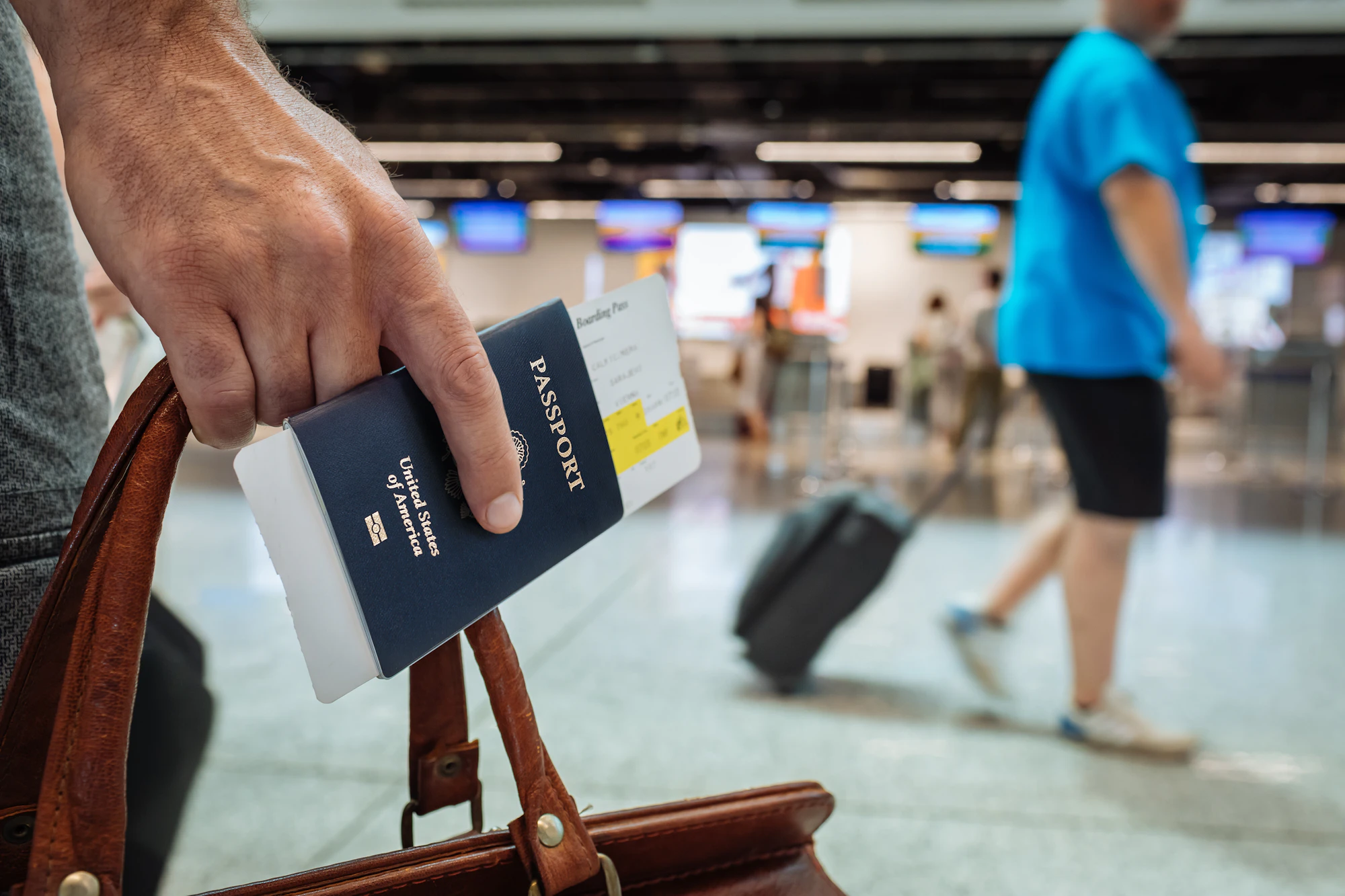The process of getting a visa is the hardest thing for people who like to travel. Many people find it hard to apply because of the documents they need and the steps they have to take. You may have even changed your travel plans when planning a trip to Europe because you thought, "Let me go to a country that doesn't require a visa." However, if you consider some factors, you can easily get a Schengen visa as soon as possible. By reading our article, you can apply for a Schengen visa in a few steps and get the visa you need to go abroad.
What Is a Schengen Visa?
A Schengen Visa is a short-term visa that enables the holder to travel within the Schengen Area. This visa is granted by a member state of the Schengen Agreement, and permits travel to any of the Schengen countries for up to 90 days within a six-month period.
The Schengen Area comprises 29 countries that have eliminated internal borders, adopting a unified visa policy. While these countries share common guidelines, procedural nuances, and documentation requirements can vary.
Citizens from non-Schengen countries that do not benefit from a Visa Facilitation Agreement with the EU are required to obtain a Schengen visa to enter any Schengen member country. Additionally, starting from May 2025, individuals eligible under the visa-free regime will need to apply for an ETIAS (European Travel Information and Authorization System).
Schengen Visa: Which Countries Can You Visit?
A Schengen visa grants you access to all member countries of the Schengen Area. Here is the list of countries you can visit with a Schengen visa:
| Country | Country |
|---|---|
| 🇦🇹 Austria | 🇱🇻 Latvia |
| 🇧🇪 Belgium | 🇱🇮 Liechtenstein |
| 🇧🇬 Bulgaria | 🇱🇹 Lithuania |
| 🇭🇷 Croatia | 🇱🇺 Luxembourg |
| 🇨🇿 Czechia | 🇲🇹 Malta |
| 🇩🇰 Denmark | 🇳🇱 Netherlands |
| 🇪🇪 Estonia | 🇳🇴 Norway |
| 🇫🇮 Finland | 🇵🇱 Poland |
| 🇫🇷 France | 🇵🇹 Portugal |
| 🇩🇪 Germany | 🇷🇴 Romania |
| 🇬🇷 Greece | 🇸🇰 Slovakia |
| 🇭🇺 Hungary | 🇸🇮 Slovenia |
| 🇮🇸 Iceland | 🇪🇸 Spain |
| 🇮🇹 Italy | 🇸🇪 Sweden |
| 🇨🇭 Switzerland |
This arrangement ensures that the list is alphabetical and split as evenly as possible between the two columns.
Additional Non-Schengen Countries Accepting Schengen Visa
Certain non-Schengen countries also allow entry to travelers holding a valid Schengen visa. These countries include:
| Country | Country |
|---|---|
| 🇦🇱 Albania | 🇬🇮 Gibraltar |
| 🇦🇬 Antigua and Barbuda | 🇽🇰 Kosovo |
| 🇧🇾 Belarus | 🇲🇰 North Macedonia |
| 🇧🇦 Bosnia and Herzegovina | 🇲🇪 Montenegro |
| 🇨🇴 Colombia | 🇷🇸 Serbia |
| 🇨🇾 Cyprus | 🇸🇹 Sao Tome and Principe |
| 🇬🇪 Georgia | 🇹🇷 Turkey |
This layout ensures that the countries are alphabetically sorted and distributed evenly between the two columns.
How to Get a Schengen Visa?
- Check how long your passport is good for for Visa Application.
Before you start the application process for a Schengen visa, you need to make sure your passport is still valid. Because when you apply for a visa, your passport's expiration date must be at least 6 months away or your application will not be looked at.
- Prepare Application Documents.
You can put together the application documents based on the type of visa you want. Students, employees, employers, and retirees will all be asked for different kinds of paperwork.
- Make an Appointment for Application.
Since February 2020, Schengen member countries have been getting applications electronically. There isn't one Schengen visa form that all countries accept, so you have to fill out the form for the country you're going to. After giving the necessary documents for the visa application, you can fill out and sign the application form online and easily make an e-appointment.
You don't need to make an appointment at the consulate to hand over your documents and undergo procedures like getting your fingerprints and photo taken. Instead, you need to make an appointment at the brokerage firm that the government has hired. After 2014, people who have given their fingerprints and whose visas say "VIS" don't have to go to the visa centre in person to visit any Schengen country.
- Go to the Schengen visa centre.
You can go to the appointment at the time and date you choose, along with your passport and other required documents, after you've paid the visa fee and had your fingerprints and photo taken.
- Pay the visa fee.
You can pay the fees for your Schengen visa and the procedures at the visa centre in cash, in Euros or Turkish Lira, at the box offices at the application centre (depending on the consulate).
- Take a photo and give fingerprints.
You have to go to the Visa Center hired by the Consulate in person to have your photo taken and your fingerprints taken. Since the data in the database is good for 5 years, you don't need to do the same process again.
- Submit your documents.
When you submit the documents, you can hand the ones you prepared ahead of time to the officer at centre. Then, you can get proof that the visas have been sent.
- Receive Documents
After the visa application is approved or denied, it is sent to the address on the passport. If it's not a busy time, like a public or official holiday, and the visa centre hasn't asked for any extra documents, the application will be finished in 3–7 days. But if there is a holdup, it could take 2 to 3 weeks to get the visa.
If You Are Applying for a Schengen Visa for the First Time
If you are applying for a Schengen visa for the first time, you may be asked for more detailed documents in addition to the standard ones. If necessary, you may even be asked to come to the consulate for an interview.
If You Have Previously Obtained a Schengen Visa
If you already have a Schengen visa, it will be easier to get a new one and it will be good for a longer time. For example, the first application will have a Schengen visa that is valid for 10 days, and the second application will have a 6-month visa.
How to Get a Long-Term Schengen Visa?
Getting a long-term Schengen visa is something that people from countries that like to travel and see new places always complain about. Visas for up to 15 days are given by most European countries, especially those that are part of the Schengen area. But it is possible to get a Schengen visa that is good for 3–6 months or 12 months, even though it is difficult:
- Fill out the application form completely.
Each country used for Schengen visa applications has a standard application form. Some countries, like Greece, want the application form to be filled out with a ballpoint pen, while others, like Germany and the Netherlands, may want it to be filled out electronically.
- Prepare the documents completely!
You must include the most up-to-date documents for the country you are applying to in your application file. This includes the bank account statement needed for the visa application, the payroll, the reservation for a place to stay, and the transportation.
- Try to have too much money in the bank.
You can get a long-term visa if you have more money in your bank account before you apply. This is something that your family can help you with.
- Identify at least 2 different Schengen plans.
If you want a long-term Schengen visa, it is best to apply with more than one trip planned. For example, if you need a visa to go to Italy in August, you should also have a travel plan for the next few months and submit travel documents with your application to make your visa last longer.
- Apply from the same country.
Getting a visa from the same country every time makes their country more confident. In other words, if you have already gotten a visa in Italy, you are more likely to get a long-term Schengen visa if you apply for a new visa in Italy. In other words, in the countries that are part of Schengen, 2-3. You can get visas that let you stay longer.
- Start your journey in the country where you obtained your Schengen visa.
One of the most important things to remember when getting a long-term Schengen visa is to go to the country from which you got your visa first. For example, you plan to visit more than one country, but you got your visa from Germany. So, after entering Germany, you can go to other Schengen countries like France and Italy. If you use your Schengen visa well, you are more likely to get a longer-term visa on your next application.
- Get long-term health insurance.
For Schengen visa applications, you need travel health insurance with a guarantee of at least 30,000 Euros. People who have valid travel health insurance for at least a year are more likely to get a long-term Schengen visa. If you're asking, "What is travel insurance and what does it do?" you can read our content to find out.
- Guarantee that you will go back to the country shortly.
If you include proof that you will go back to the country where you want to get a visa among the documents you have ready for your visa application, your chances of getting a long-term visa go up.
- Introduce yourself with a personal petition.
To get a long-term Schengen visa, you have to write a letter to the country's consulate asking for a Schengen visa and explaining why you want to travel. This petition can say that when you get a long-term visa, you have new travel plans because you like to go places.
- Prefer countries that give easy visas.
Since some countries in the Schengen Area are very strict about Turkish visa applications, people who want to visit these countries with high visa rejection rates are usually only given a single-entry visa for the length of their trip. Countries like Belgium, the Czech Republic, Denmark, Sweden, Luxembourg, Sweden, and Norway make it hard to get a visa. Germany, the Netherlands, Italy, and Greece are more lenient when it comes to giving out visas.
- Guarantee that you will return to your country after the trip is over.
To get a long-term visa, you also need to make sure that your country's authorities are sure you will return.
Long-Term Schengen Visa Granting Countries
Some of the countries that issue Schengen visas for long periods are:
| Country |
|---|
| 🇩🇪 Germany |
| 🇫🇷 France |
| 🇳🇱 Netherlands |
| 🇮🇹 Italy |
| 🇸🇪 Sweden |
When Should I Start the Schengen Visa Application Process?
You need to start the process for getting a Schengen visa at least 20–30 days before you plan to travel. If you want to apply during a busy time like a public holiday or holiday, you should start this process even earlier.
Schengen Visa Application Centres 2023
| Country | Visa Centre |
|---|---|
| 🇩🇪 Germany | Idata |
| 🇦🇹 Austria | Vfs Global |
| 🇧🇪 Belgium | Vfs Global |
| 🇨🇿 Czech Republic | Vfs Global |
| 🇩🇰 Denmark | Vfs Global |
| 🇪🇪 Estonia | Vfs Global |
| 🇫🇮 Finland | Vfs Global |
| 🇫🇷 France | Vfs Global |
| 🇳🇱 Netherlands | Vfs Global |
| 🇪🇸 Spain | BLS Spain Visa |
| 🇸🇪 Sweden | Vfs Global |
| 🇨🇭 Switzerland | TLS Contact |
| 🇮🇸 Iceland (represented by Denmark) | Vfs Global |
| 🇱🇻 Latvia | Vfs Global |
| 🇱🇮 Liechtenstein (represented by Switzerland) | TLS Contact |
| 🇱🇹 Lithuania | Vfs Global |
| 🇱🇺 Luxembourg | Vfs Global |
| 🇭🇺 Hungary | As Visa Solutions |
| 🇵🇱 Poland | Vfs Global |
| 🇵🇹 Portugal | As Visa Solutions |
| 🇸🇰 Slovakia | Vfs Global |
| 🇸🇮 Slovenia | Vfs Global |
| 🇬🇷 Greece (Kosmos Only For Istanbul) | Vfs Global |
Documents Required for Schengen Visa
Here is a list of the documents you need to obtain a Schengen visa.
- Application form,
- Bank account information
- Biometric photo
- Residence
- Copy of identity card and passport
- Book a hotel
- Flight ticket booking
- Overseas travel insurance
Schengen Visa Documentation Essentials
The Schengen visa application process demands specific documents from different categories of applicants. Here's a concise overview:
Required Documents for Employees
- 4A Service Breakdown
- Copy of Identity Certificate
- Photocopies of vehicle license, title deed, and promissory note
- Original passport
- Biometric photo
- Visa application form
- Visa will be requested
- Travel health insurance
- Full-fledged civil registry sample
- Certificate of activity
- Proof of employment
- Employer's letter
- Signature circular
- Payroll
- Copy of trade registration certificate
- Wet signed bank statement
- Tax plate
Required Documents for Students
- Parental consent for those under 18 years of age
- Biometric photo
- Example of residence taken from e-Government
- Copy of identity card
- Student certificate
- Passport
- Travel health insurance policy
- Business documents of the sponsor, bank account statement, signature circular
- Visa application form
- Visa sponsor petition
- Visa fee
- Copy of passport photo page
- Copies of old Schengen visas, if any
Required Documents for Retirees
- Application form
- Biometric photo
- Passport
- Travel health insurance
- Visa fee
- Hotel and flight reservations
- Bank statement or pension wallet
- Bank statement
- Copy of T.R. identity card
- Photocopy of passport with photo
- Copies of old Schengen visas, if any
- Photocopy of marriage
Passport and Biometric Photo Requirements for Getting a Schengen Visa
To get a Schengen visa, your passport must be valid for at least three months after the visa's expiration date. It must also have at least two blank pages.
On the Schengen visa application form, you should not forget to include a 35x45 mm close-up photo taken at least 6 months ago.
What should I pay attention to when filling out the Schengen application form?
The Schengen visa, which is used as a standard by 26 countries, is not as hard to get as it seems. To get a visa, you must prepare the documents asked of you correctly and fill out your application completely. You can fill out the form in German, English, French, or Turkish, depending on what language is required in your country.
- The information you put on the Schengen visa application form must help your application. If you give false information, you might get a rejection or have to wait longer for the process to finish.
- First, you need to get the application form from the country's website and fill it out by hand or on a computer.
- You should make sure that none of the fields on the application form that are about you are left blank.
- If there's a question you don't care about, you can write "No Answer" (NA).
- If the person applying is under 18, one of their parents needs to sign the form.
- If you are filling out the application form by hand, don't forget to use a black pencil.
What are the Travel Health Insurance Conditions for Schengen Visa Application?
- Having valid travel health insurance for the length of your stay in the Schengen area is one of the most important requirements for getting a Schengen visa. So, you must also show the visa officer your travel insurance when you apply for a visa. "Do I have to have overseas travel health insurance?" By reading our article, you can find out more about why travel health insurance is required.
- For a visa, you need health insurance for a visa to cover any health problems you might have while you're abroad.
- The insurance coverage must be at least EUR 30,000 and be valid throughout the Schengen area. Health insurance pays for all costs associated with sending the insured back home for treatment or death.
- If your visa is canceled, you can ask the consulate to refund the cost of your travel insurance if you can show proof that your visa was denied.
Flight Plan and Accommodation Document for Schengen Visa Application
You should apply for a Schengen visa after making your flight plan and accommodation document, which shows your plane ticket and hotel reservations. Because you have to show the visa officer your flight itinerary and a document that shows where you will be staying.
A flight itinerary is a confirmed document that can be used to check the schedule of a flight online. The accommodation document for the visa application is proof of where the person will be staying in the Schengen area for the whole trip.
How Long is the Schengen Visa Duration?
The length of time a tourist Schengen visa is good for depends on the person applying for it. Visas last for 3 months, 6 months, 1 year, 2 years, 3 years, and 5 years, and give the right to stay from 1 week to 90 days.
How Many Money Should I Have in the Account to Get a Schengen Visa?
The amount you need in your account depends on where you're getting a visa. For example, if you want to go to France, you must have at least 5,000 TL in your account. A family with one child must have around 15,000 TL in their account if they want to go there.
How long should the passport be valid for the Schengen visa application?
When applying for a visa, the passport must be good for at least 6 more years. But this doesn't mean that you can only get a 6 month visa. For a passport that expires in 6 months, you can get a Schengen visa that is valid for 1 year, 2 years, or 5 years.
How Many Days Does a Schengen Visa Come Out?
Even though it depends on how busy the consulate is and if it is an official holiday, the processing time is usually between 10 and 15 working days. If your visa takes longer than this average, you should send in your paperwork no more than 3 months and no less than 15 days before you leave.
Why is a Schengen visa refused?
There are many reasons why an application for a Schengen visa might be turned down. These
- Crimes from the past or the present
- The documents that were asked for were not provided in full or did not meet the requirements set by the embassy.
- Passports with damage being given out
- Travel health insurance is invalid
- Providing insufficient evidence of the purpose of the trip
What to Do If a Schengen Visa Is Rejected?
- If the consulate or embassy of the country you want to visit does not accept your visa application, you have 1 month to appeal the decision. When you go to get the answer, you will be given a document that explains why you were denied a visa. You can also find out how to file an appeal and when the deadline is for filing an appeal. But you can get your money back for the visa fee you already paid.
- You can go through the appeals process at the right consulate by writing an appeal petition for the right visa section.
What Should I Do to Extend a Schengen Visa?
If you need to extend your Schengen visa for work or health reasons, you must do so at the consulate of the Schengen country where you are. For the visa to be extended, the total length of stay cannot be longer than 90 days. Visa requests for stays longer than 90 days will be turned down.
Get Travel Health Insurance Now!
Ikamet.com helps you find the most comprehensive travel health insurance by comparing offers from more than insurance companies. You can find out about travel health insurance on Ikamet.com or by calling our Information Line. This will help you find the best travel insurance policy for you. "How and Where to Buy Travel Health Insurance?" You can find out more about it by reading our article.











Member discussion